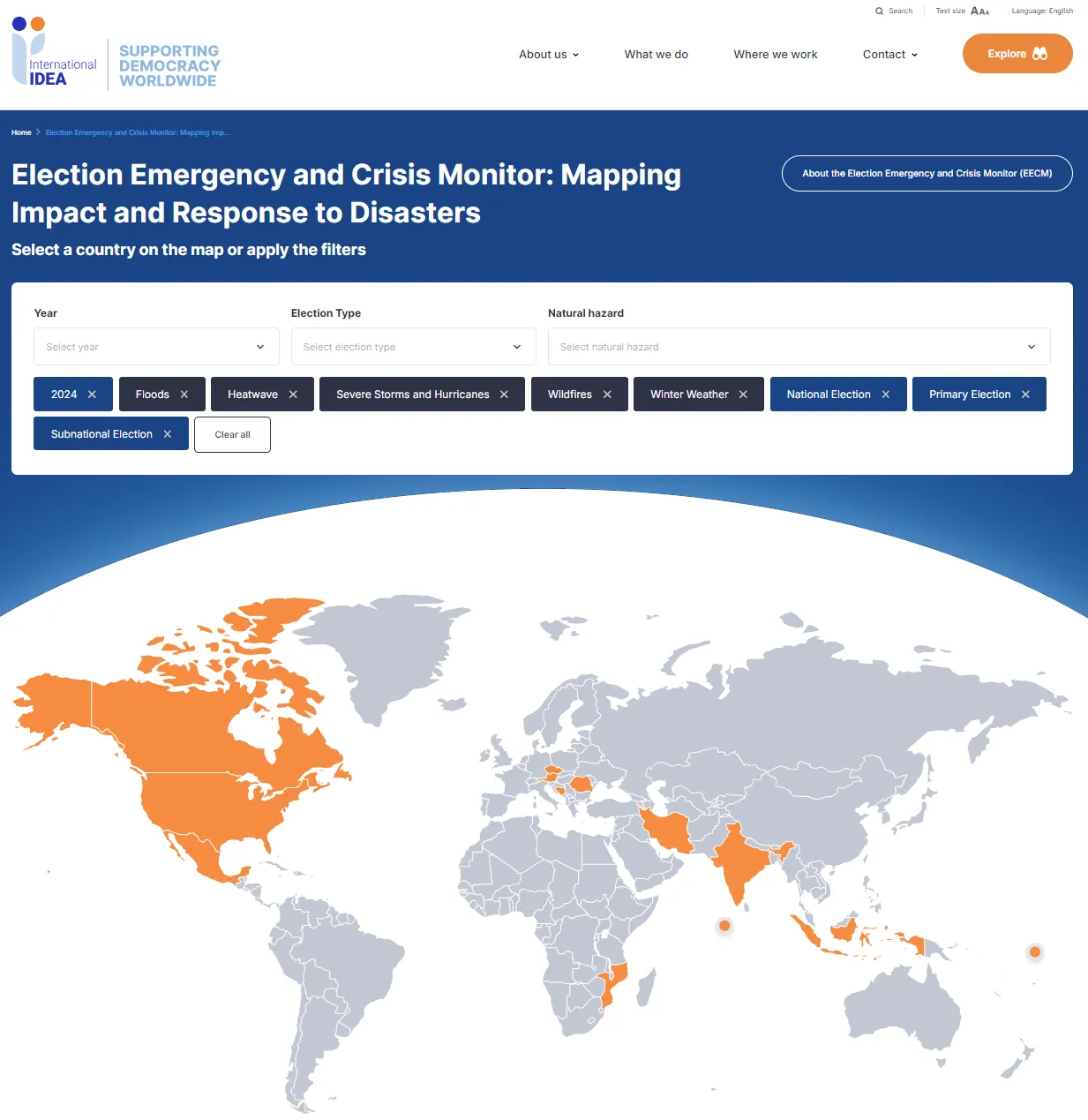New Dashboard Tracking the Growing Impact of Extreme Weather on Elections Globally

STOCKHOLM – Extreme weather events disrupted elections in at least 13 countries in 2024, with floods, heatwaves, hurricanes, and wildfires affecting key electoral processes, such as voter registration, candidate nominations, training of frontline workers, campaigns, voting operations, and the announcement of results. This highlights the growing impact of climate change on democratic systems.
A new dashboard from the International Institute for Democracy and Electoral Assistance (International IDEA) tracks elections affected by disasters and extreme weather events, providing a continuous overview of these disruptions globally.
“As extreme weather events continue to disrupt communities and democratic processes worldwide, governments must recognise elections as critical infrastructure,” said Erik Asplund, Senior Programme Officer at International IDEA. “Protecting elections is essential to safeguarding the public goods and services they are designed to ensure.”
In 2024 alone, extreme weather events influenced national and subnational elections in countries across all regions, including Austria, Bosnia and Herzegovina, Canada, the Czech Republic, India, Indonesia, Iran, the Maldives, Mozambique, Mexico, Romania, Tuvalu, and the United States. Many of these events were exacerbated by climate change, threatens election activities at multiple stages of the electoral cycle.
Professor Sarah Birch, from King’s College London emphasises the need for global reform: “We must act on the lessons learned from recent elections conducted under extreme weather conditions. Greater collaboration across the election, climate change, and disaster management fields will strengthen our shared knowledge and help ensure that elections can proceed, even in adverse conditions.”
Dr Ferran Martinez i Coma, from Griffith University calls for action from policymakers: “To protect the integrity of elections worldwide, we need disaster preparedness measures embedded in electoral processes, as well as robust risk management frameworks and resilience building measures.”
Key features of the dashboard include:
Comprehensive Coverage: The dashboard currently includes 65 country briefs dating from 2001 to 2024 that can be searched by country, year, region, election type (national, subnational, primary and referendum), and type of hazard (floods, severe storms and hurricanes, wildfires, heatwaves, winter weather, earthquakes, volcanic activity)
In-depth Analysis: Each country brief provides a concise overview of the disaster's impact on the country and its electoral process, detailing the event, its societal effects, connections to climate change, procedural and legal adaptations, and measures taken to safeguard electoral integrity, including voter turnout data where available.
Valuable Resources: The dashboard offers a bibliography of sources for further reading on each event, providing election stakeholders with essential references to deepen their understanding of the challenges and responses to disasters during elections.
Building on insights from the dashboard, the upcoming International IDEA report, Protecting Elections Amidst Natural Hazards in a Changing Climate (early 2025), will delve deeper into the challenges disasters pose to electoral integrity. Written by Erik Asplund (International IDEA), Sarah Birch (King’s College London), Ferran Martinez I Coma (Griffith University), and Madeline Harty (Independent Consultant), the report will offer key insights and lessons on strengthening legal, institutional, and management frameworks to safeguard elections in a changing climate.
For more information on the number of elections affected by extreme weather in 2024, visit International IDEA’s dashboard.
For more information on The Impact of Natural Hazards on Elections visit our project page here.



